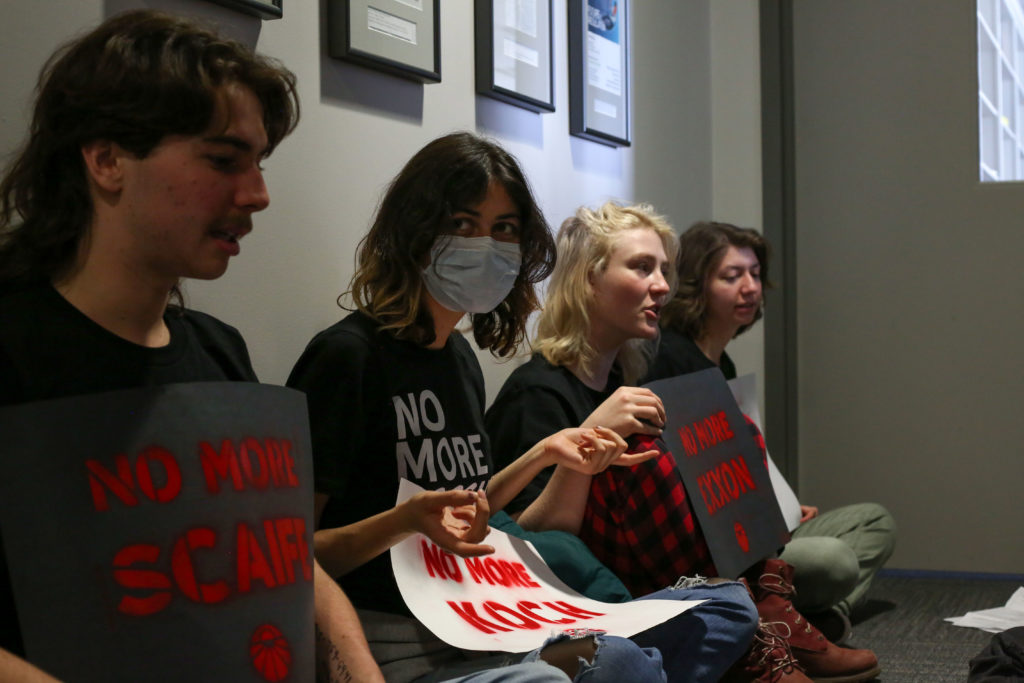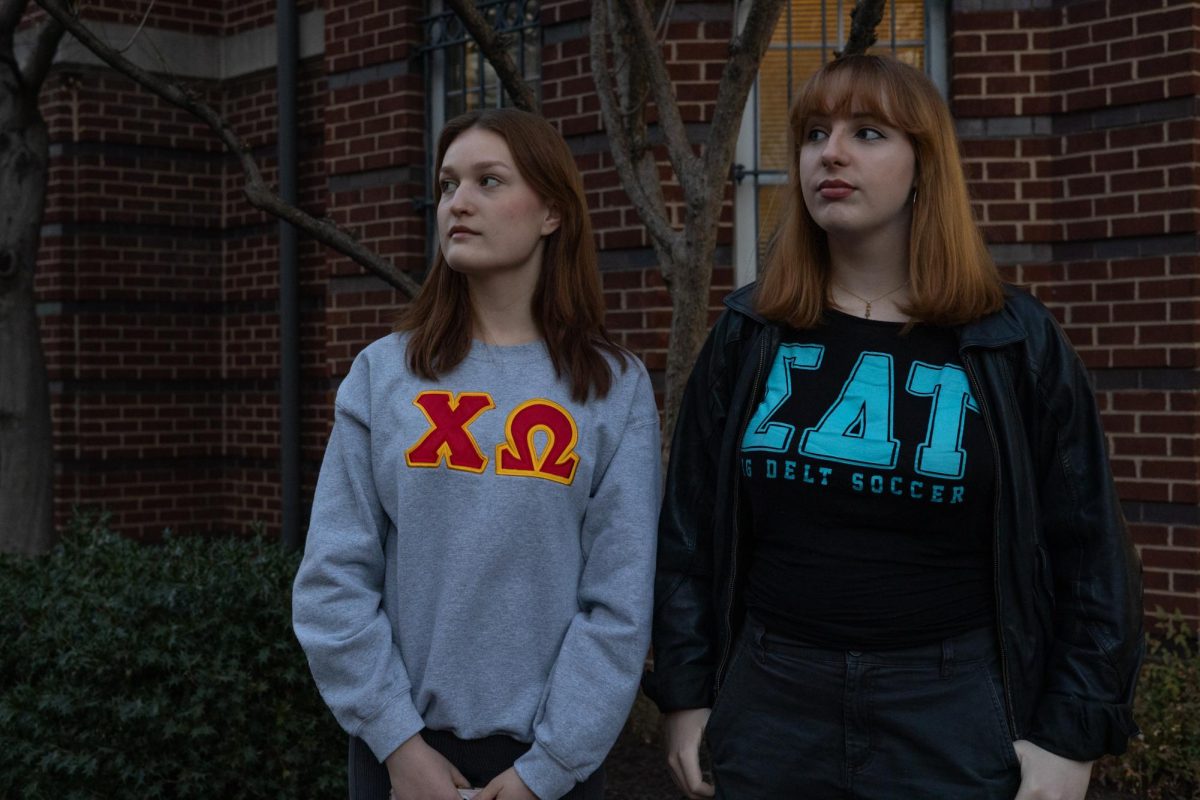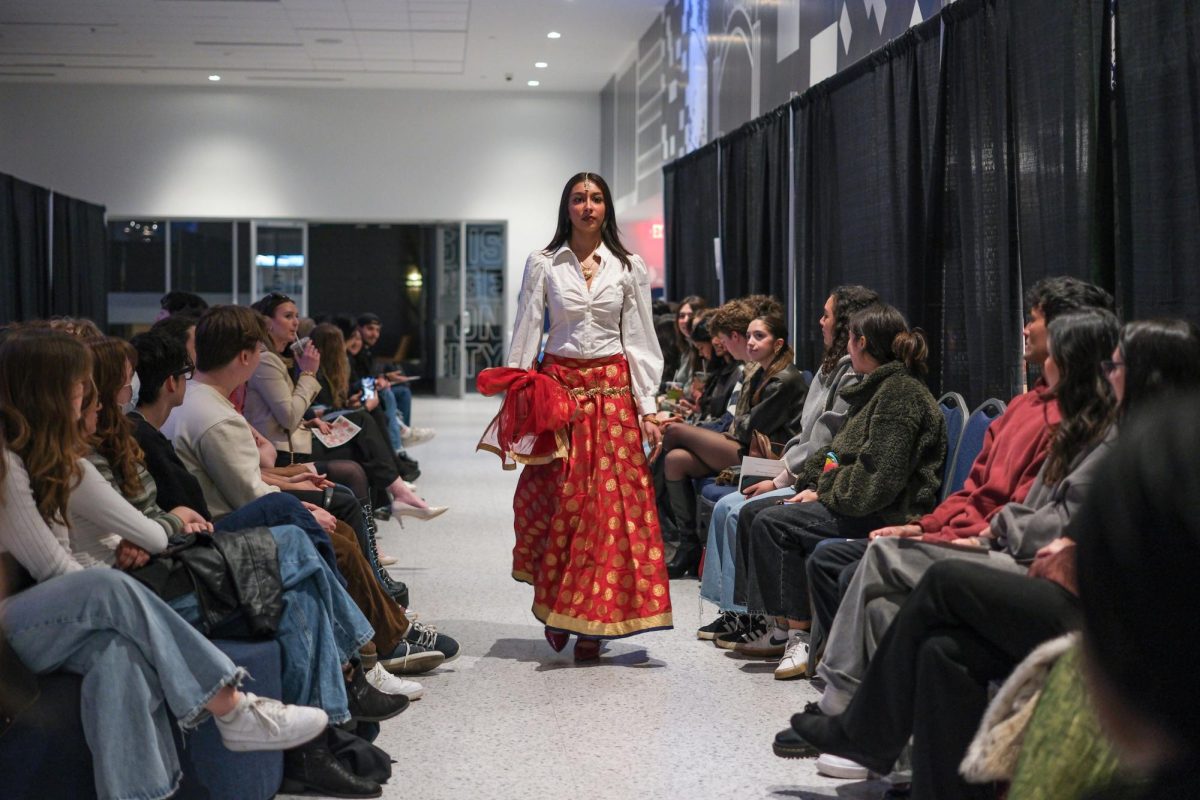Sunrise GW protesters staged a 12-hour sit-in at the Regulatory Studies Center last Monday to protest the RSC’s 12 years of operations and call on RSC officials to cut ties with the fossil fuel industry.
Nine protesters occupied an RSC suite – a GW academic center researching regulatory policy located on the sixth floor of the Media and Public Affairs building and a common target of Sunrise criticism – from 11 a.m. to 11 p.m. demanding a ban on fossil fuel funding accepted by the RSC. The protest is Sunrise’s most recent action targeting the RSC’s ties to the fossil fuel industry, following a mock funeral blocking the intersection of 21st and H streets in October outside of the RSC offices and protesters disrupting an RSC anniversary event in 2020.
Senior Jake Lowe, a member of Sunrise and a coordinator of the international coalition Fossil Free Research, said Monday’s protest was a part of Fossil Free Research’s Days of Action in which students across the U.S., U.K. and Canada took part in protests to demand a ban on fossil fuel research money accepted by their own institutions and universities.
Lowe said Sunrise has been leading its campaign calling on the RSC to reject funding from fossil fuel industry institutions like ExxonMobil and the Charles Koch Foundation for about two years. He said money the RSC accepts from fossil fuel industry corporations causes bias in the center’s research, ultimately providing studies that favor its benefactors.
“When you look at the research they actually produce, it’s very clear that they’re acting on account of their funders to promote climate disinformation and deregulation, and that’s just not something that we think GW should facilitate,” Lowe said. “We don’t think GW’s name should go on that kind of work, and it makes us ashamed to go to school here.”
Lowe said he wrote and released a report on the RSC about a year ago with nationwide climate campaign UnKoch My Campus, which stated that the RSC receives funding from actors with histories of climate disinformation and obstruction of climate action.
Watchdog organization Public Citizen accused the RSC in 2019 of political bias and promoting an anti-regulatory political agenda in its research. The report stated key funders like the Charles Koch Foundation and ExxonMobil donated more than $1 million to the center.
“We won’t stop campaigning against the Regulatory Studies Center until they reject funding from the fossil fuel industry and allied interests,” Lowe said.
In the first hours of the sit-in, RSC and Students Rights & Responsibilities staff as well as GW Police Department officers asked protesters to avoid causing a disturbance for workers remaining in the office space and asked them not to block office exits within the suite.
GWPD officers initially told Sunrise protesters that they wouldn’t be permitted to stay in the RSC office space past 10 p.m. when the building closes to the public, but officers eventually agreed to allow Sunrise to occupy the area up until their 12-hour marker at 11 p.m. as long as they remained peaceful. Protesters passed the time by giving speeches about the RSC’s ties to the fossil fuel industry on a Facebook livestream, eating snacks, playing cards and playing live music on instruments.
Joe Cordes, the co-director of the RSC, said while RSC officials understand students’ passion for climate justice, they recognize Sunrise’s protests as a violation of GW’s policies regarding academic freedom. He said he believes protesters were “mistaken” in their criticisms of the RSC Monday, citing a 2021 statement on the RSC’s mission and a 2020 RSC fact sheet providing details on the sources of the center’s funding.
“They violated the student code which prohibits actions that are ‘disruptive of normal University functions [or that] encompass the physical takeover or occupation of university facilities and spaces, whether or not they are in use at that time,’” Cordes said in an email. “We learn from respectful discourse, not threats, disruption and intimidation.”
Sophomore Keigan McCullagh, Sunrise’s communications director, said the group talked to Students Rights and Responsibilities staff during the sit-in about the possibility of disciplinary action following the protest, but they said it’s unclear what repercussions Sunrise protesters may face until the group meets with SRR officials about the case. They said despite possible disciplinary action, Sunrise doesn’t intend to put its campaign on hold for a semester because of possible probation.
“That was a cost-benefit analysis that we considered before we decided to do this,” McCullagh said. “So we’re just going to have to deal with that.”
McCullagh said the police presence decreased as the sit-in went on as GWPD officers recognized that the protest would remain peaceful for its 12-hour duration. They said the five officers who were initially present in the first few hours of the action ultimately decreased to one officer as the sit-in stretched later into the night.
“Once they realized that everyone had managed to find a different place to work and that we were not escalating beyond the level we were at, they just decided that they were going to let us do what we came here to do,” they said.
Junior Aza Evans-Townsend, a member of Sunrise’s war room committee responsible for overseeing Sunrise’s campaigns and actions, said Sunrise has had past interactions with the RSC like taping posters to the officials’ doors – which protesters were later fined for – and disrupting a RSC anniversary event in 2020. She said the nine protesters staging Monday’s sit-in were prepared for the possibility of being arrested.
“The RSC will likely be frustrated and likely want us to be punished, but it’s going to be dependent on how GWPD responds to their requests for us to be treated,” Evans-Townsend said.
They said prior to the action, the student group consulted with its lawyer, who confirmed the sit-in could be considered “unlawful entry” since the RSC offices are private property, increasing the risk of arrest “drastically” from past actions performed by Sunrise.
“I think a sit-in is important because we’re not being heard, specifically by this office and this institution,” Evans-Townsend said.
Evans-Townsend said she hopes the RSC is able to recognize the “conflict of interest” created by officials accepting fossil fuel money, but said she doesn’t expect them to cut ties with the fossil fuel industry as a direct result of the sit-in. They said they hope the RSC is able to publicly recognize the origins of its funding to be transparent with the GW community following the action.
“I think it’s important to acknowledge that funding transparency is not something we have at George Washington University,” she said. “All of the money that we have found from the fossil fuel industry that goes to the Regulatory Studies Center office has been through our own research and through looking at tax records.”
Erika Filter, Nikki Ghaemi and Grace Chinowsky contributed reporting.








